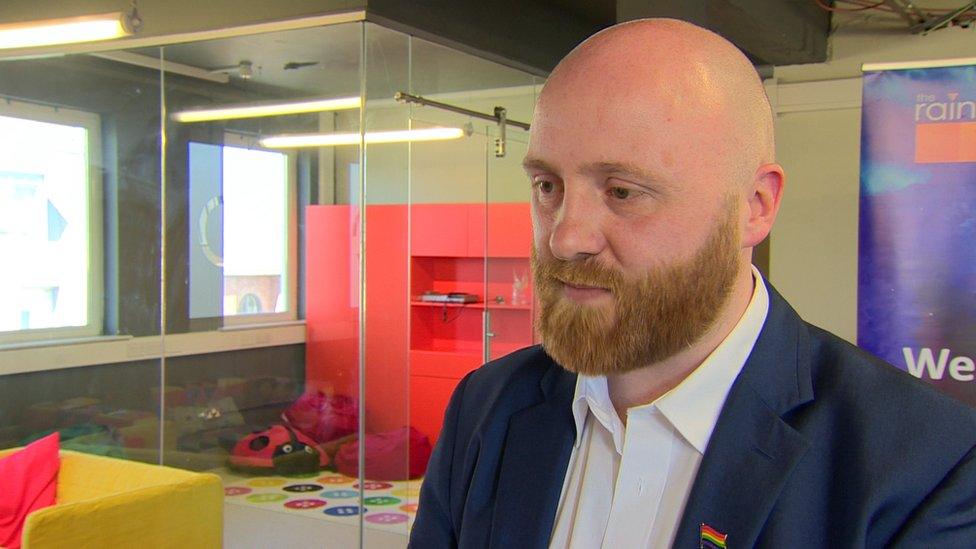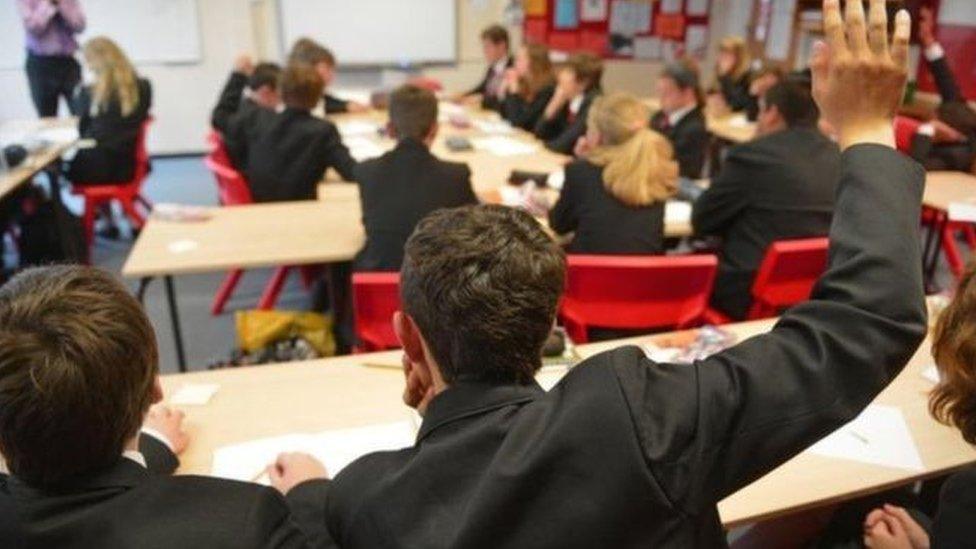Two-thirds of LGBT pupils 'feel unwelcome at NI schools'
- Published
- comments

Some LGBT pupils said they face bullying, including name-calling and isolation
Two-thirds of lesbian, gay, bisexual and transgender (LGBT) young people in Northern Ireland do not feel welcomed or valued in their post-primary school.
Almost half had also experienced bullying as a result of their sexual orientation or gender identity.
Those are two of the key findings of research into experiences of LGBT pupils commissioned by the Department of Education.
The research was delivered in April 2016 but has just been made public.
In 2015, the department asked an external consultancy, at a cost of £28,690, to examine issues affecting LGBT pupils in post-primary schools.
Their final report was based on responses from 532 young people aged between 16 and 21 and five focus groups.
They were asked a series of questions about their experiences in school, including bullying.
The research also looked at how - and if - LGBT issues were taught in schools.
'Isolated by others'
Just over half of the lesbian, gay and bisexual pupils said they had come out in post-primary school.
However, over a quarter said they had not spoken to anyone in school about their sexual orientation.
While over half of the pupils who responded felt safe in school, many also reported negative experiences.

An "institutional anti-LGBT bias" exists in the education system, claims John O'Doherty
These included:
a lack of teaching about LGBT issues on the school curriculum
unhelpful sexual health education
almost four in 10 pupils saying they had been made to feel uncomfortable by teachers
those who reported bullying to staff being left unsatisfied by how their complaint was handled
The main forms of bullying the pupils said they experienced included name-calling, being isolated by other pupils or being hit or kicked.
Sixty-five of the pupils in the research identified as transgender.
Of those, 40 had told other pupils about their gender identity and many said they felt supported by their peer group.
Only a third, however, had told a member of school staff that they were transgender.
Some schools had helped transgender pupils by letting them change their name or introducing gender-neutral uniforms or toilets.
The report says: "There may be scope to identify approaches which would help to encourage a more progressive and welcoming environment for young LGBT people."
However, it does not offer specific recommendations for change.
'Ensure discrimination ends'
The director of the Rainbow Project, a gay and lesbian support group, said the research showed that young LBGT people were being marginalised in many schools.
"This demonstrates institutional anti-LGBT bias, at all levels of education in Northern Ireland," said John O'Doherty, "particularly within the Department of Education itself, directly breaching its statutory duty to promote equality of opportunity for LGBT people."

Just over half of LGBT pupils said they have come out in post-primary school
"What we need to hear from the Department of Education, immediately, is what they will do to ensure that homophobic and transphobic discrimination ends in every school, in every sector, across Northern Ireland."
In response, the department said that updated relationship and sexuality education guidance had been published in 2015.
"The Department of Education requires each school to have in place its own written policy on how it will address the delivery of relationship and sexuality education," a spokesperson said.
"A school's policy should be subject to consultation with parents and endorsed by a school's board of governors."
Previous research from the department had found that just over one in five schools cover LGBT issues with pupils.
The department also said that the delay in publishing the report was down to there being no education minister in place.
"As the research was commissioned by a minister it was the department's original view that the publication of the research should be cleared by a minister."
"In light of the increasing volume of enquiries about the review we have decided that the research should now be published."
- Published26 August 2017
